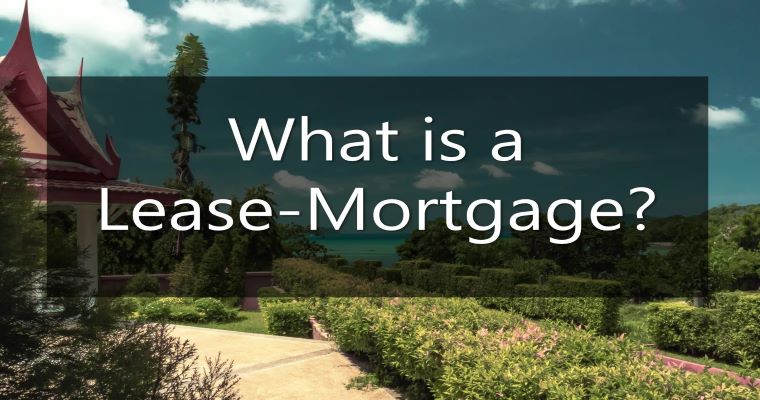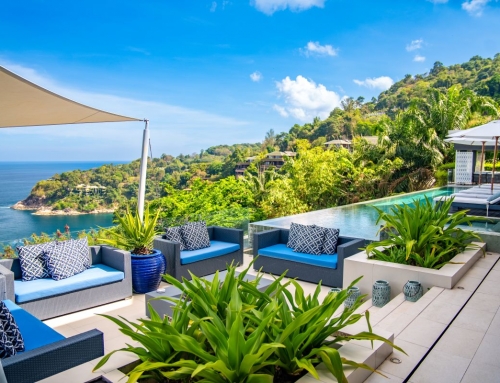The Lease-Mortgage is a relatively new addition to the various structures used to assist foreigners with the ownership or control of landed property. This article attempts to explain how the Lease-Mortgage works and why it may be better than the more commonly used pre-paid 30+30+30 leasehold contract.
Foreigners who want to live in Phuket or invest in Phuket property usually have decisions to make on the type of home they want to own, whether a condo or a villa. Phuket Villas are popular with foreigners, but if the lease or ownership structure is not written correctly, it can pose problems down the road.
Land ownership by foreigners is not allowed, and the Thai companies often employed are not always structured properly. Furthermore, some Secured Leases, while technically ticking every legal box, have been deemed void by the courts when challenged.
Thai company ownership is a very viable option for anyone operating a proper company running a legitimate business. This means you must have real local shareholders (not nominees), pay your taxes, and file accounts. Where things fall down for foreigners who go this route is when they attempt to cut corners.
Leasehold can be a safer and easier way to own property in Thailand. But most new development villa sales are structured so that buyers are presented with a prepaid structured, suggesting that they get an automatic 90-year renewal term. but the maximum lease term allowed is only 30 years.
The Lease-Mortgage is an intriguing, but little-used structure which respects the need for a 30 year leasehold contract, while at the same time understanding that the shortcoming of a lease in Thailand is its relatively short duration.
Not only is the maximum allowable term 30 years, but there cannot be contractual extensions, only renewals. Even an extension clause written into the lease agreement is only a promise, and if the lessor (freeholder) has sold the property, that promise is not enforceable against the new owner.
Despite these facts, many leases are still sold with pre-paid 90-year terms. What a Lease-Mortgage does is identify the pre-payment beyond the first 30 years for what it really is – a loan. And since the most common way to secure a loan (for immovable property) is through a mortgage, the Lease-Mortgage subjects the loan to interest payments, and registers the mortgage against the title of the land.
In practical terms, this is already being done with any 30+30+30 lease. But if the money given by the lessee to the owner for two additional lease terms is structured as a mortgage, the lessee has a legal means of enforcing a lease renewal.
When 30 years are up, and the lease is renewed, then the lessee (as the holder of the mortgage) simply “set-off” that portion of the mortgage, and it is effectively converted into 30 years worth of rent. The same is then done after 60 years (if the lease is structured over 90 years).
Any such, lease renewal is still at the discretion of the freehold owner, but if the owner for whatever reason decides not to renew, then the lessee – as the holder of the mortgage on the property – can simply foreclose and force the sale of the property in order to recoup the pre-payment (plus interest).
How well this works in practice, as with most issues related to registering a property, is down to the Land Office official dealing with the registration of the lease, and the endorsement of the mortgage against the land.
Land Office employees will not always see these arrangements the same way, and one person may have the structure accepted on a Monday, while the same structure is rejected by the same the office on a Thursday.
Lease-Mortgage arrangements were created by lawyers, and don’t contravene the letter of law. If challenged in court, however, it could be deemed a foreign ownership scheme which violates “the spirit of the law,” which might also be the case with simple renewable long term leases.
Because this structure is not yet widely used, we really don’t know which way the wind will blow on lease-mortgages. However, we do know that, even should a judge rule against the ownership structure, the lessee would still be protected through the registered mortgage.
The pioneer of the Lease-Mortgage structure was the law firm of Duensing-Kippen, who have read and approved the content of this article. To read more on Lease-Mortgage Structures, please click here.
You may want to read some of our related Phuket property articles here:
The Benefits and Advantages of Buying a Freehold Condominium in Thailand
An Overview on Phuket Property Prices
Understanding the Concept of Freehold Property Ownership
How to Buy a Condo in Phuket: The Complete Guide
The Problem with Condo and Villa 30+30+30 Leaseholds in Phuket
8 Top Tips for Finding Your Perfect Condo in Phuket
10 Good Reasons to Buy a Condo in Phuket





Social Contact